THE VIEW FROM WEST DAVENPORT
Regulation Coming
Home To Roost
By MIKE ZAGATA • Special to www.AllOTSEGO.com
For several decades our nation’s environmental policies have, for the most part, been driven by emotion or what “seemed,” according to popular opinion, to be the “right” thing to do. As a result, many of those policies lacked a scientific basis and the unintended consequences are, like lost chickens, coming home to roost.

New York State’s ban on fracking may well be such an example. There are some in the environmental community who use natural gas to cook or heat their homes, yet they demand that gas not come from fracked wells in Pennsylvania. Let’s take a closer look at what that means to the release of carbon and the impact on climate change.
The gas they demand comes largely from the Gulf of Mexico, about 1,200 miles to the south of New York. It is transported from the Gulf of Mexico to New York via pipeline at about 800 psi (pounds per square inch) of pressure.
To maintain that pressure inside the pipe the gas must be run through large reciprocating engines or turbines that compress it. This gas compression is done about every 40 miles along the pipeline at compressor stations and, guess what, natural gas is the fuel that powers the engines or turbines used to compress the gas to increase the pressure in the pipe.
•
In other words, not all the gas that enters the pipeline from the wells in the Gulf of Mexico arrives at the other end of the pipeline – much of it is burned as fuel to maintain the pressure inside the pipe and move the gas along the pipeline.
To maintain the pressure along the 1,200 miles the gas is being moved, it takes about 30 compressor stations. To move the gas from Pennsylvania to New York, a distance of about 80 miles, it would take two. Therefore, if we divide 30 by 2, we can quickly see that it takes about 15 times more gas for fuel to power the engines/turbines to move the gas in the pipeline from the Gulf of Mexico than it would take to move it from Pennsylvania to New York.
The people who oppose using the fracked gas from Pennsylvania are contributing to the 15-fold increase of released carbon by demanding we burn more gas than necessary to transport the gas they are using and thus are driving climate change. How’s that for irony?
•
Pacific Gas & Electric (PG&E), California’s largest utility, has announced it is utting off power to about 1.5 million Californians. How can that be, and what drove them to do that?
We’ve all read about California’s catastrophic wildfires, but how many of us understand what triggered them? It was a combination of things, including population growth and home construction being allowed in a fire-dominated ecosystem. However,
good intentions may have been the primary cause.
Every time the U.S. Forest Service, the state’s Forest Management Agency of PG&E, attempted to manage the forest and brush by reducing the fuel load, they were sued by a well-intentioned advocacy group. That too went on for decades allowing the accumulated fuel of dead and dying wood to build up.
When fire came, and that was certain to happen, it came with a vengeance. Entire communities were consumed.
As a result, PG&E was sued as a spark from one of its electric transmission lines may have ignited one of the fires. The groups that sued PG&E to keep the company from removing that fuel were, however, not held to be responsible. That may change going forward.
A year has passed and we’re now into another fire season. To avoid being held culpable for any fires this year, PG&E made a pre-emptive move. They cut off power to about 1.5 million customers. The lack of science-based forest management policy has indeed come home to roost for those affected Californians.
For New York to fulfill its rush toward renewable energy sources, including solar and wind, it must think about how to avoid having the “chickens” come home to roost. The “chickens” will be the expanded electric transmission lines that will
be needed to move the electricity generated by all the new wind and solar farms.
What new unintended consequences will we be asked to face as a result?



Mike: You might find it helpful to know that the average consumption of natural gas to run the compressor stations varies between 2 and 3 percent of the net gas delivered at the end of the pipe. This fact may alter your conclusion a bit. Concerned Otsego Son